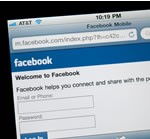
When offered a smorgasbord of social media choices, college students have continually chosen Facebook as the best social site for class collaboration. And the reason is simple: Students are most familiar with Facebook.
Colleges and universities have experimented with a host of social networks, but one of the foremost researchers of how students use social sites said Facebook – one of the first networks to gain traction among technology-savvy educators – remains the favorite for organizing group meetings and discussing upcoming assignments and exams.
Read more about social media in higher education…
College coaches struggle with appropriate Twitter policies
College political leaders, social media prove to be a dangerous combination
Reynol Junco, a faculty member at Lock Haven University of Pennsylvania who has conducted several social networking surveys on college campuses over the past year, said that even as social media options have expanded in higher education, students still lobby their professors and instructors for official course Facebook pages.
“One thing has been clear from our observations in those studies: When given the choice of a number of social technologies to use as part of a course, students will overwhelmingly choose Facebook,” Junco wrote in a blog post.
Even when professors didn’t create course Facebook pages, students used Facebook to organize study groups and discuss course readings, Junco wrote.
A college student who responded to one of Junco’s surveys about student reaction to the use of Twitter and Ning in the classroom said Facebook would have been a more natural fit for the class.
“I think [using Facebook] would’ve been easier and a little more comfortable for people because I think pretty much everyone in my class had a Facebook and nobody had either one of these things,” the anonymous student said, referring to the alternative social networks.
Another survey respondent said Facebook would be the most efficient social media tool for educators because “people generally get on there every day [and] they are going to see the stuff and invites a lot quicker than others.”
College students will always use Facebook primarily as a social tool – to scan photos, watch videos, and interact with friends and strangers alike – but official Facebook course pages could convert some of that social use to extended class time.
“College faculty have an opportunity to engage students using Facebook and to help them use the site for educational good,” Junco wrote.
How professor-sanctioned Facebook use impacts students’ grades has been a point of debate in recent years.
A study published last year charged that scanning Facebook news feeds and sending texts while studying were “negatively related to overall GPA,” echoing findings from social media research presented in the past two years.
Using eMail while studying was an entirely different story.
Incorporating eMail into schoolwork had a positive impact on student grades, likely because students use eMail to communicate with professors and teaching assistants, according to the study, “A Decade of Distractions: How Multitasking Affects Student Outcomes.”
In other words, students use eMail for academic purposes, while social media sites like Twitter and Facebook are social web activities usually unrelated to homework or studying.
Fifty-two percent of study respondents said they send and receive texts while doing schoolwork, and 34 percent said they used Facebook while studying.
The debate over the distraction of social media on college campuses heated up last April when an infographic, “Is Social Media Ruining Students?” published by OnlineEducation.net, distilled reams of social media research and lists the pros and cons of how social sites are used on campuses.
Facebook and studying can be an academically toxic combination, lowering grades by up to 20 percent, according to the infographic.
The infographic also shows that students who abstain from Facebook–only 4 percent of U.S. college students can claim this–work three times more per week than their counterparts on the popular site.
- Research: Social media has negative impact on academic performance - April 2, 2020
- Number 1: Social media has negative impact on academic performance - December 31, 2014
- 6 reasons campus networks must change - September 30, 2014
Comments are closed.